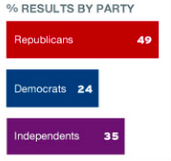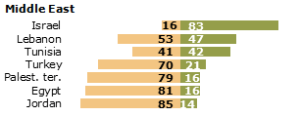Torture: Should it be Applied to the modern Middle East?
Imagine you are in a room , and a man is seated under a dim light. There is a bomb about to go off in a highly populated area, putting the lives of many innocent people at risk. The man seated in front of you might have knowledge to stop the bomb…do you torture it out of him?
, and a man is seated under a dim light. There is a bomb about to go off in a highly populated area, putting the lives of many innocent people at risk. The man seated in front of you might have knowledge to stop the bomb…do you torture it out of him?
The Middle East has been in turmoil for years, but today it is recognized has a center for modern terrorist groups. Due to the rise of terrorism and the War on Terror, torture and its use has arguably become the largest debate of the 21st century. The debate is largely seen as black and white; pro-torture and anti-torture. Both sides concede torture violates human rights and is overall a disgusting thing, thus was made illegal by the UN in 1984, but disagree on whether or not torture’s use is justified in some situations. Some even question if torture is effective or necessary at all. It is often a focus in political debates as well, and there is a correlation between the political parties and which side of the torture coin they fall on (Republicans tend to
if torture is effective or necessary at all. It is often a focus in political debates as well, and there is a correlation between the political parties and which side of the torture coin they fall on (Republicans tend to  be pro, Democrats anti). This essay
be pro, Democrats anti). This essay will explore both sides and their stances, and determine why torture in the Middle East today is obsolete, and should not be utilized.
will explore both sides and their stances, and determine why torture in the Middle East today is obsolete, and should not be utilized.
The classic and most cited argument on behalf of pro-torture is known as the “ticking bomb scenario”. It was presented in the intro of this essay . Here’s how it works
. Here’s how it works ; imagine a known terrorist has planted a bomb in a populated area, directly putting the lives of many citizens at risk. This terrorist is then captured. Since there is a small time frame available
; imagine a known terrorist has planted a bomb in a populated area, directly putting the lives of many citizens at risk. This terrorist is then captured. Since there is a small time frame available to stop this catastrophe, torture advocates state that torture in this case is justified, as it is a drastic situation that garners immediate attention. An example of this scenario today can be seen in the capture of the drug Kingpin Joaquin Guzman. In the past, there seems to have been somewhat of a consensus among both sides that torture is justified in this kind of situation, however there recently has been a pushback against this idea. This pushback states that the ticking time bomb situation is unrealistic in the modern Middle East. During a debate, Hilary Clinton said this argument is ideologic; most terrorist groups today plan for the long run and stage multiple attacks at once, and often times the torture victim does not even know the full extent of the plan; just a small piece. Thus, the anti-torture side does concede with the justifiability of torture in a ticking time bomb scenario, yet claim
to stop this catastrophe, torture advocates state that torture in this case is justified, as it is a drastic situation that garners immediate attention. An example of this scenario today can be seen in the capture of the drug Kingpin Joaquin Guzman. In the past, there seems to have been somewhat of a consensus among both sides that torture is justified in this kind of situation, however there recently has been a pushback against this idea. This pushback states that the ticking time bomb situation is unrealistic in the modern Middle East. During a debate, Hilary Clinton said this argument is ideologic; most terrorist groups today plan for the long run and stage multiple attacks at once, and often times the torture victim does not even know the full extent of the plan; just a small piece. Thus, the anti-torture side does concede with the justifiability of torture in a ticking time bomb scenario, yet claim the argument is not as valid
the argument is not as valid as it seems due to new terrorist methods in the Middle East.
as it seems due to new terrorist methods in the Middle East.
Pro-torture activists claim that the anti-torture side is idealistic and unknowingly accept something called “collateral damage”, which basically boils down to stating that many innocents are killed during a war, through events
that the anti-torture side is idealistic and unknowingly accept something called “collateral damage”, which basically boils down to stating that many innocents are killed during a war, through events such as bombings. They bluntly state that collateral damage is unavoidable in modern warfare, which means women and children will always be put at risk and hurt. Because of this, activist say the harming of one individual is ideal and even necessary, since only one person will be getting hurt (the torture victim), and as a result
such as bombings. They bluntly state that collateral damage is unavoidable in modern warfare, which means women and children will always be put at risk and hurt. Because of this, activist say the harming of one individual is ideal and even necessary, since only one person will be getting hurt (the torture victim), and as a result collateral damage can be minimized. These same activists say the collateral damage hurts women and infants, but “there are no infants and women in Guantanamo Bay”. This belief about collateral damage is another justification to torture, and can be understood along the lines
collateral damage can be minimized. These same activists say the collateral damage hurts women and infants, but “there are no infants and women in Guantanamo Bay”. This belief about collateral damage is another justification to torture, and can be understood along the lines of “better them than us”. This is an oversimplification; who is to say that torturing one man can directly lead to minimizing something that is- as the pro side puts it- “unavoidable”?
of “better them than us”. This is an oversimplification; who is to say that torturing one man can directly lead to minimizing something that is- as the pro side puts it- “unavoidable”?
On behalf of the anti-torture side, their main arguments have to do with whether or not the information received through torture is reliable, accurate, and necessary. Former CIA official John Kiriakou’s states that the CIA used water boarding to “break” a terrorist involved with 9/11, yet claims
received through torture is reliable, accurate, and necessary. Former CIA official John Kiriakou’s states that the CIA used water boarding to “break” a terrorist involved with 9/11, yet claims the FBI was getting good intel before the CIA became involved, and then questions whether or not the information
the FBI was getting good intel before the CIA became involved, and then questions whether or not the information received through illegal means could have been obtained in more lawful methods. Kiriakou goes on to say that there are numerous examples of cases where relying on information
received through illegal means could have been obtained in more lawful methods. Kiriakou goes on to say that there are numerous examples of cases where relying on information obtained through torture has led to disaster. Because of these disasters, Kiriakou says there is an “overwhelming consensus of intelligence professionals that torture produces unreliable information”.
obtained through torture has led to disaster. Because of these disasters, Kiriakou says there is an “overwhelming consensus of intelligence professionals that torture produces unreliable information”.
Kiriakou’s statements about torture deals a heavy blow to the pro-torture side; if a former CIA official stands against torture, what does that really say about its effectiveness?
The pro-torture side rebuts this argument by saying it does not matter how unreliable the information obtained is; the important thing is that any potential information can help save lives. They cite a situation with a terrorist named Khalid Sheikh Mohammad, a valuable captured terrorist that helped orchestrate 9/11 and beheaded a U.S. reporter, and how he has not been subjected to torture. They reason that this man is high ranking in Al-Qaeda, thus he must have valuable information that can be used to prevent more attacks, and possibly be used to eliminate the organization. The pro-torture side says that although the information retrieved can be unreliable, the possible benefit of any shred of truthful and useful information is worth torturing.
Yes, there is an indication that Khalid Sheikh Mohammad may have useful information, that does not mean torture is necessary to obtain this intel.
Rather than inflicting harm on an individual, the anti-torture side suggests using other methods such as truth serums and building a friendly-rapport with the detainees to humanely and legally obtain this information. David Patraeus, a former U.S. Army general who resigned as director of the CIA in 2012, gave insight and evidence that these other methods worked by saying, “While we are warriors, we are also human beings…if you want information from a detainee you become his best friend, and that is what worked for us with our special operators as well as our conventional forces in both Iraq and in Afghanistan.” This is a second example of a former CIA official speaking against torture, and even providing alternatives that worked in the Middle East today. This counteracts the argument made by the pro-torture side that believes torture is justified and necessary to squeeze out any possible information from a detainee.
Besides inflicting pain on an individual, potentially torturing an innocent, or possibly receiving useless or untruthful information, the anti-torture side claims torture gives the country a bad name in the Middle East, and can even “breed jihad“, which leads to terrorism. The United States today is more heavily involved in the Middle East than in the past, and some of the United State’s methods of torture has bred hatred among these countries, even within the United State’s allies. A main reason behind this is that torture offends these people’s religion and culture, as they are forced to do several unspeakable and disgusting acts. Bernard Haykel, a professor of Middle Eastern Studies at New York University, writes that “dehumanization is unacceptable in any culture, but it is especially so in the Arab world. Homosexual acts are against Islamic law and it is humiliating for men to be naked in front of other men”. Haykel concedes that even this is an incredibly basic level of torture in comparison to other torture methods used by the United States in the Middle East, and says the leaks of these torture methods to the outside world put the United States in a dark light in the eyes of the Middle East. This huge embarrassment for the United States was highlighted in the reveal of what was going on in Abu Ghraib, where unnecessary horrors like physical and sexual abuse were dominant in the prison camp. As seen in the video above, when torture reports leak out, there is an outcry is both domestic and foreign populations, which in turn both embarrasses the United States and puts it in a dark light. This undermines the United States security and presence in the Middle East, and easily shows why the Middle East as a whole views the United States so poorly.

Furthermore, the anti-torture argument claims torture is often used for the wrong reasons. Dr. Ruth Blakely, head of The Rendition Project says, “torture should be renounced…it is not necessary for the functions it is intended to serve”. She states that it some authoritarian states, like many in the Middle East, torture is used to instill fear and deter political opposition among the population. This can be seen in Pakistan, where hatred against law enforcement and United States is nothing new, as those that oppose these enterprises are systemically tortured by law enforcement and even United States soldiers occupying the area. This is a powerful argument that ties back to how torture makes the United States “look bad” to Middle Eastern countries, weakening the United States presence in this region of the world. Many arguments say torture is necessary in a time of war, but do not address torture being used in a political way.
 Since the United States today is so involved with the Middle East, it must be careful to not do anything to make more enemies or do anything that may result in more terrorist attacks. Through the evidence provided, it is clear that although torture may have some benefits, it causes more harm than good, and there are even alternate methods that achieve the same results. Not only is torture illegal and inhumane, it gives the United States a negative connotation in the Middle Eastern region of the world. Furthermore, the inhumane treatment undermine what the United States stands for, which results in weakening the credibility of American presence in these countries. The United States should not utilize torture in the modern Middle East, and should turn to more humane and effective methods to gain the intelligence it needs.
Since the United States today is so involved with the Middle East, it must be careful to not do anything to make more enemies or do anything that may result in more terrorist attacks. Through the evidence provided, it is clear that although torture may have some benefits, it causes more harm than good, and there are even alternate methods that achieve the same results. Not only is torture illegal and inhumane, it gives the United States a negative connotation in the Middle Eastern region of the world. Furthermore, the inhumane treatment undermine what the United States stands for, which results in weakening the credibility of American presence in these countries. The United States should not utilize torture in the modern Middle East, and should turn to more humane and effective methods to gain the intelligence it needs.
So no, if you find yourself in a dimly lit room with a suspected terrorist and a bomb is “ticking away”, try some method other than torture to get that information; it just doesn’t work and isn’t worth it.
References:
Blakeley, Ruth. “Why Torture?” Review of International Studies 33.3 (2007): 373-94. Print.
Clark, Simon. “Ex-CIA Director Petraeus Says He Opposed Detainee Torture.” wsj.com. TheWallStreetJournal, 11 Dec. 2014. Web. 2015.
“Former Head of the Defense Intelligence Agency Says Torture Produces Unreliable Information.” humanrightsfirst.org. HumanRightsFirst, 11 Dec. 2007. Web. 16 Apr. 2015.
Harris, Sam. “In Defense of Torture.” huffingtonpost.com. huffingtonpost.com, 17 Oct. 2005. Web.
Husain, Shahid. “Torture breeds hatred that’s hard to heal.” thenews.com. thenews.com, 26 July 2012. Web. 2015
Schiemann, John W. “Interrogational Torture: Or How Good Guys Get Bad Information with Ugly Methods.” Political Research Quarterly 65.1 (2012): 3-19. Print.
Image 1: http://www.democratandchronicle.com/story/opinion/letters/2014/12/23/alternatives-torture/20805385/
Image 5: http://www.pewglobal.org/2013/07/18/chapter-1-attitudes-toward-the-united-states/
Image 6: http://www.cagle.com/2014/12/cia-torture-report-2/
Video: http://www.youtube.com
Hyperlink 1: http://www.newsweek.com/al-qaeda-vs-isis-battle-soul-jihad-317414
Hyperlink 2: http://legal.un.org/avl/ha/catcidtp/catcidtp.html
Hyperlink 3: http://www.newyorker.com/news/news-desk/was-torture-the-key-to-bringing-down-a-kingpin
Hyperlink 4: https://prospect.org/article/defusing-ticking-time-bomb-excuse
Hyperlink 5: http://www.britannica.com/EBchecked/topic/1470200/waterboarding
Hyperlink 6: http://www.foxnews.com/story/2007/03/15/khalid-sheikh-mohammed-confesses-to-daniel-pearl-execution/
Hyperlink 7: http://islam.about.com/od/jihad/f/jihad.htm
Hyperlink 8: http://www.newyorker.com/magazine/2004/05/10/torture-at-abu-ghraib
Hyperlink 9: http://www.therenditionproject.org.uk


